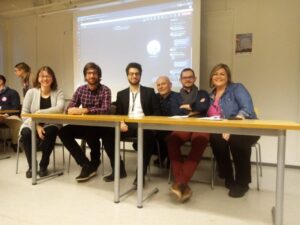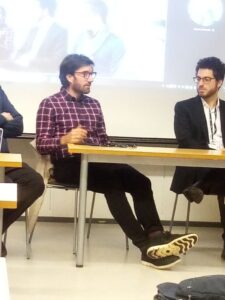By Simo Määttä, University of Helsinki
The Fourth Helsinki Conference on Emotions, Populism, and Polarised Politics (HEPP4) was held on 11-13 December 2023, at the University of Helsinki. The Conference assembled a wide range of international researchers at all career stages, to examine populism, polarisation, and emotions, particularly from a discursive and cultural approach. It included contributions from a wide range of fields. There were 170 presenters and more than 200 participants from various parts of Europe, as well as attendees from Brazil, Australia, Argentina, India, South Africa, Nigeria, and the United States.
The keynote speakers were prominent scholars on discursive approaches to populism and nationalism; Benjamin DeCleen, Hande Eslen-Ziya and Mercedes Barros, who, throughout her visit in Helsinki, also gave a Christina seminar talk and doctoral course at the UH Dirty Words: Feminism, populism and hegemony.
The conference was co-funded by the EC Horizon2020 project D.Rad Deradicalisation in Europe and beyond, Now Time Us Space project funded by the Kone Foundation, as well as the Datafication of the Society Project. Key areas of exploration include the emergence of grievances, alienation, and polarization, along with an investigation into the rise of religious populism, the formation of epistemic communities, and the logic of datafied forms of communication contributing to polarization. We are also interested in exploring the concepts of “North” and “South,” the relationship between them globally and locally, as well as the hegemonic struggle in this field.
 Members of the ARENAS project consortium participated in a panel discussion on “ The circulation of narratives, doxae, and implicit meanings in populist discourse”. The panel discussed how narratives, doxas, and implicit meanings, which are important linguistic and discursive elements of populist discourse, are circulated across times, spaces, and medias. The panel started with an overview of theorisations of circulation in post-structuralist continental thought through the prism of performativity (Simo Määttä, University of Helsinki). Subsequently, Samuel Vernet (Aix-Marseille Université) analysed the circulation of doxa in the most listened-to radio news program in France reporting the invasion of the US Capitol by pro-Trump protesters on January 7, 2021. Julien Longhi (CY Cergy Paris Université) discussed the ethos, authority, and legitimacy of the “scientific leader” in the circulation of conspiratorial discourse about Covid-19. Mattia Retta (University of Helsinki) analysed the circulation of hate speech through implicit meanings in the tweets of Italian extreme-right politicians.
Members of the ARENAS project consortium participated in a panel discussion on “ The circulation of narratives, doxae, and implicit meanings in populist discourse”. The panel discussed how narratives, doxas, and implicit meanings, which are important linguistic and discursive elements of populist discourse, are circulated across times, spaces, and medias. The panel started with an overview of theorisations of circulation in post-structuralist continental thought through the prism of performativity (Simo Määttä, University of Helsinki). Subsequently, Samuel Vernet (Aix-Marseille Université) analysed the circulation of doxa in the most listened-to radio news program in France reporting the invasion of the US Capitol by pro-Trump protesters on January 7, 2021. Julien Longhi (CY Cergy Paris Université) discussed the ethos, authority, and legitimacy of the “scientific leader” in the circulation of conspiratorial discourse about Covid-19. Mattia Retta (University of Helsinki) analysed the circulation of hate speech through implicit meanings in the tweets of Italian extreme-right politicians.
Simo Määttä:
Circulation of hateful topics and narratives through the prism of performativity
The repetition of the same narrative and the same topic all over again is one of the key characteristics of populist rhetoric. Now, if neurological studies indicate that thoughts become more durable when they are repeated, poststructuralist philosophy offers insights of a non-quantifiable nature into the power residing in the circulation of topics and narratives. Thus, in Limited Inc. (1988), Derrida stressed the importance of citationality or reiteration as forming a “breaking force” that is at the core of performative power: utterances gain more power when they are cited—not only in speech but also in writing. In this talk, I will review some of the most important theorizations of the reifying power of reiteration in poststructuralist philosophy and schools of thought inspired by it and apply them to examples of hate speech in ordinary online discourse.
Keywords: performativity, circulation, populist rhetoric, hate speech
Samuel Vernet:
Constructing the antagonistic populist figure: Doxa in the coverage of the Jan. 6th 2021 events at the US Capitol on a French radio channel
In this paper, I consider that the expression of doxa is the expression of a viewpoint which ignores itself as such and stays mainly implicit and not discursively expressed as particular and subjective. This point will be discussed in the field of journalism, through an analysis of the transcript of the morning broadcast of the most listened-to radio news program in France covering the “attack” on the US Capitol on January 6th, 2021. I will show that doxa is conveyed by discursive cues that allow the researcher to identify and characterize the nature of the particular but supposedly shared “common sense” which is often taken for granted in journalist discourse and which participates, in this particular case, in the construction of an antagonistic populist figure.
Keywords: doxa, journalistic discourse, critical discourse analysis, framing analysis
 Julien Longhi:
Julien Longhi:
Ethos, authority, and legitimacy of the “scientific leader” in the circulation of conspiratorial discourse about Covid-19
The purpose of my intervention will be linked to the construction of the scientific authority and the legitimacy of Professor Didier Raoult in the media sphere after the COVID-19 pandemic. Thus, echoing a first work (Longhi 2022) on his posture during the crisis and the polemics and controversies around his positions, I will show, in particular, how the use of emotions and the anchoring in a discourse that appeals to “common sense” tends to embed his discourse in a populist tonality, which is very polarising within the public debate, as well as in the media and the scientific world.
Keywords: authority, ethos, emotions, populist tonality
Mattia Retta:
Circulation of hate speech through implicit meanings in the tweets of Italian extreme-right politicians
This talk addresses the role of implicit hate speech as a strategy aimed at shaping ideologies and reinforcing political polarisation and the contrast between in and out-groups. This strategy is above all else a tool for propaganda, largely employed in populist narratives, that can effectively convey derogatory content. This exploitation of implicitness serves a double purpose: (i) it contributes to the formation or strengthening of xenophobic and/or sexist beliefs by easing the acceptance and the sharing of questionable arguments; (ii) it allows the authors to overcome any form of human or automatic detection of offensive contents in social networks.
The talk is based on the analysis of a corpus of tweets and comments published between February 2020 and February 2021 in which right-wing Italian politicians and other users discuss issues of cultural belonging, national security and health crisis.
